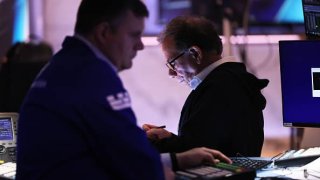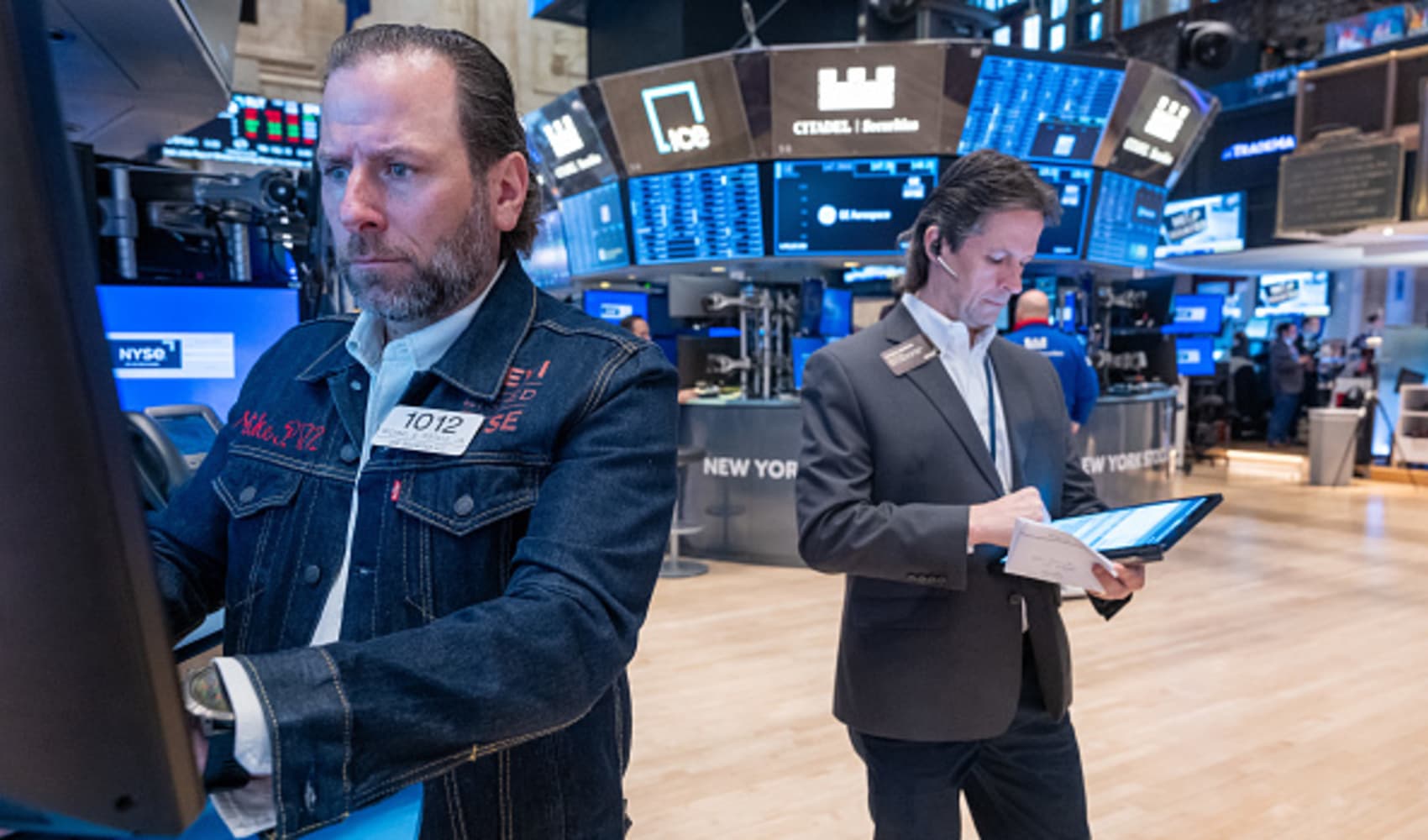
This is CNBC's live blog covering European markets.
European markets closed higher Monday after posting their steepest decline of the year so far last week.
The pan-European Stoxx 600 index provisionally closed 1.1% higher, with all sectors and major bourses in positive territory. Travel and leisure stocks led gains, up 2.4%.
Commerzbank was among the top performers, up 5% on its first day back in Germany's blue-chip DAX index. Gains retreated slightly later in the day and shares of the bank were 4.6% higher at market close.
Get New England news, weather forecasts and entertainment stories to your inbox. Sign up for NECN newsletters.
British Prime Minister Rishi Sunak on Monday signed a new trade deal with the European Union designed to remedy problems caused by the Northern Ireland Protocol. Sunak is due to hold a press conference with European Commission President Ursula von der Leyen later.
Sterling rose 0.9% against the U.S. dollar on the news, hitting a session high of around $1.2051.
Preliminary inflation prints will be out from France and Spain on Tuesday, Germany on Wednesday, and Italy and the euro zone on Thursday.
Money Report
The European Central Bank has explicitly said it intends to hike rates by another 50 basis points in March, though investors are assessing how likely they are to move significantly beyond that.
It follows the U.S. Federal Reserve's preferred inflation gauge showing a stronger-than-expected increase in prices, which — combined with a tight labor market and resilient consumer spending — has intensified rate hike expectations.
Asia-Pacific markets were mixed on Monday after stocks on Wall Street also posted their steepest decline of 2023.
U.S. equity futures, meanwhile, were higher.
Sterling jumps as UK and EU sign new trade deal in Brexit breakthrough
Pound sterling jumped after British Prime Minister Rishi Sunak signed a new trade deal with the European Union to tackle issues with the Northern Ireland Protocol.
The British currency hit a session high of $1.2051, up 0.9%, shortly after the announcement mid-afternoon. The euro also rose 0.7% to hit a session high of $1.0613.
The new agreement, known as the Windsor Framework, will be "the beginning of a new chapter" for relations between the U.K. and EU according to Sunak, who spoke at a press conference after the announcement.
European Commission President Ursula von der Leyen added that the Framework "respects and protects" the "legitimate" interests of the respective markets.
— Karen Gilchrist and Elliot Smith contributed to this report.
Ericsson CEO says Europe's telecom industry is likely unsustainable
The CEO of Sweden's Ericsson said Europe's telecom industry structure is likely unsustainable, calling for more consolidation across the region.
"The big problem in Europe is really that our customers can simply not afford to build out the networks and I think that is going to hurt European competitiveness long term," Ericsson CEO Börje Ekholm told CNBC's Karen Tso at Mobile World Congress in Barcelona, Spain.
Ekholm said in countries such as the U.S., China and India, consolidation had meant there were now just two or three operators nationwide.
In Europe, however, "it is 200 operators, pretty much four plus in almost every country. It is an industry structure that is probably unsustainable and that needs to be addressed," he added.
Shares of Ericsson traded around 1% higher during afternoon deals in London.
— Sam Meredith
Private equity has delivered the best returns during economic uncertainty: Bain & Co.
Christophe de Vusser of Bain & Co. says it expects the same to happen "during this cycle."
Stocks that did well last year will do well this year, strategist says
Roger Lee, head of U.K. equity strategy at Investec, shares his views on the diverging fortunes of U.S. and U.K. stock markets.
Commerzbank CEO: German economy is 'resilient'
Commerzbank's CEO Manfred Knof described elements of Germany's economy as "resilient" in an interview with CNBC's Annette Weisbach.
"The German Mittelstand is extremely resilient," Knof said, as he discussed Commerzbank's re-entry into Germany's DAX index. The "Mittelstand" describes Germany's medium-size companies, which typically fare well during periods of economic instability.
He also noted companies were moving away from investing in China and instead putting more money in North America and Australia.
Commerzbank dropped out of Germany's blue-chip index in 2018, but rejoined Monday after taking measures to restore profitability.
Knof told CNBC his outlook on the German economy was "better than some people think," as Commerzbank and its customers are "in rather good shape."
Reflecting on the recent string of interest rate hikes by the European Central Bank, Knof said he expects "a little bit more to come."
"[A rate of] 3 plus something is probably what we should expect," he said, as interest rates of 3% "will become the normal."
Commerzbank forecast its 2023 results would be "well above" those seen in 2022 after the bank delivered a better-than-expected fourth quarter in February.
— Hannah Ward-Glenton
Stocks on the move: SBB up 9.5%, Dechra Pharm down 15%
Nordic property firm Samhällsbyggnadsbolaget topped European stocks in the morning's bullish trade, gaining 9.5% as the European construction and materials sector climbed 1.4%.
Rolls-Royce extended recent gains, up 6% after smashing expectations for annual profits.
Dechra Pharmaceuticals, the British maker of veterinary products, plunged 15% after reporting a slide in first-half profit from £53.4 million pounds ($63.9 million) to £29.7 million.
— Jenni Reid
We expect an extended 5G market peak of many years, Nokia CEO says
Pekka Lundmark discusses the outlook for 5G at the Mobile World Congress in Barcelona.
UK energy price cap reduced for spring, but costs remain elevated
A regulator-set limit on the amount British energy suppliers can charge households has been cut by nearly £1,000 ($1,194).
From April 1 to June 30, bills will be capped at £3,280 for gas and electric combined, down from £4,279 at present. Regulator Ofgem said it was due to recent falls in wholesale energy prices.
The U.K. government is subsidizing part of consumer energy bills until April 2024, meaning that the average household will pay around £3,000. However this is still more than double the average in 2021, and around £500 more than the current average due to a reduction in the subsidy.
Many Brits are continuing to struggle with the increased cost of living, with inflation still above 10%. Widespread strike action is ongoing as workers in various sectors demand higher pay.
— Jenni Reid
Commerzbank shares up 4% as bank reenters Germany's DAX
Commerzbank shares shot up in early trade after Germany's second-biggest lender rejoined the country's DAX blue-chip stock index.
— Katrina Bishop
European markets open higher
Europe's Stoxx 600 index was up 0.8% shortly after Monday's open, with all sectors in positive territory,
It comes after European markets posted their steepest decline of the year so far last week. This week, traders will be watching for inflation prints from France, Spain, Germany, Italy, and the euro zone.
Energy stocks led gains Monday, up 1.43%, followed by the insurance sector, up 1.4%.
Germany's DAX index shook off some of last week's pessimism to gain 1.15%, while France's CAC 40 was up around 1% and the U.K.'s FTSE 100 was 0.75% higher.
— Jenni Reid
CNBC Pro: 'The market has gone too far:' Chief global strategist predicts when the Fed will cut rates
Despite efforts by the U.S. central bank to tighten financial conditions, "the market has gone too far," according to Seema Shah, the chief global strategist at Principal Global Investors,
The strategist told CNBC how the Federal Reserve might react and when it will cut interest rates that could boost stock markets.
CNBC Pro subscribers can read more here.
— Ganesh Rao
Investors need to 'control what they can control,' says Baird
The market is currently experiencing the effects of "too much good news at once," according to Baird analyst Ross Mayfield. With inflation remaining hot and the Federal Reserve expected to continue rate hikes, Mayfield advises investors to "control what [they] can control."
"First, automate things: dollar cost averaging (investing across regularly scheduled intervals) is a great avenue to find outperformance in volatile/sideways markets," wrote Mayfield in a Friday note.
"Second, revisit your allocation to ensure you're well diversified and on-plan."
— Hakyung Kim
Fed's Mester says rates need to go above 5% to quell inflation
Interest rates need to go even higher for inflation to come down, Cleveland Federal Reserve President Loretta Mester said Friday.
"I see that we're going to have to bring interest rates above 5%," she told CNBC's Steve Liesman during a "Squawk Box" interview. "We'll figure out how much above. That's going to depend on how the economy evolves over time. But I do think we have to be somewhat above 5% and hold there for a time in order to get inflation on a sustainable downward path to 2%."
Mester made news recently when she revealed that she was among a small group of Fed officials who, at the Jan. 31-Feb. 1 Federal Open Market Committee, wanted a half percentage point rate hike rather than the quarter-point move the panel approved.
— Jeff Cox
CNBC Pro: Investor says tech has yet to bottom — and reveals the FAANG stocks to avoid
Bear market rally or a new bull market? Market pros are undecided about this year's tech bounce, but investor Mark Hawtin thinks the worst could be yet to come.
And while FAANG stocks are popular among many investors, Hawtin believes some are riskier bets than others.
Pro subscribers can read more here.
— Zavier Ong
European markets: Here are the opening calls
European markets are heading for a positive open Monday, bucking a more negative trend in their Asia-Pacific counterparts overnight.
The U.K.'s FTSE 100 index is expected to open 31 points higher at 7,917, Germany's DAX 2 points higher at 15,260, France's CAC up 11 points at 7,227 and Italy's FTSE MIB up 156 points at 27,167, according to data from IG.
Earnings are set to come from Saipem, Bunzl and Commerzbank. There are no major data releases Monday.
— Holly Ellyatt






